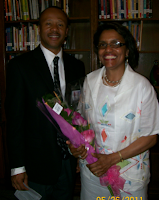This review was conducted by the New Jersey Department of Education: 2008 - 2009
This post includes the state's recommendations for improving the achievement of Dwight Morrow High School students in the area of School Culture.
SCHOOL CULTURE
This is what the school should do in order to improve.
1. Through staff development, the school should work to transform the cultural mindset of staff into one that is geared toward an effort paradigm, meaning that all students possess the ability to achieve mastery and teaching will be done until mastery is achieved.
2. The school should provide professional development in differentiated instruction and sensitivity training in cultural awareness, with the focus on how to demonstrate high expectations for all students.
3. The school leadership should establish a recruitment plan to attract and engage parents and community in the development of an active partnership in school success.
 |
| Time to wake up and smell the flowers |
It does not take a brain surgeon to determine that the recommendations from the state given in 2009 have been ignored. In almost every report the State is suggesting Professional Development and training for teachers. Why is the Board of Education having a problem formulating objectives for the Chief School Administrator? It does not matter who the CSA is, the goals do not change. The needs of the students, teachers and parents remain the same. It is time for that retreat.
The Board of Education, once elected works for the State of New Jersey. The State of New Jersey has given recommendations that should be formulated into objectives that the Chief School Administrator must begin to address. It is time to buckle down and deal with the real problems facing our students and teachers. The state is telling us in no uncertain terms that there is a canyon between our children and their teachers.
What are we going to do about this?
"How are the children?"







